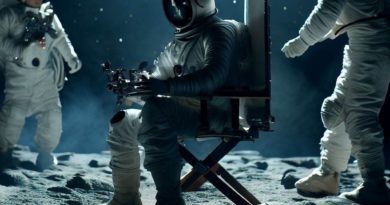‘Department of Truth’ #17 touches down on the Moon landing hoax
On the far end of the spectrum of weird beliefs — the way-out-there side — are the people who claim that the 1969 Apollo 11 Moon landing was faked on a Hollywood sound stage. James Tynion IV’s The Department of Truth, published by Image Comics, explores this grand old dame of conspiracy theories in issue #17. Perhaps the strangest aspect of the whole thing is that some people still believe it.
An early sense of wonderment and disbelief, historically, might be more understandable. A 1976 Gallup poll showed that 28% of Americans thought the first Moon landing could have been faked. You can almost see why people would not understand this strange technology that took us so far away. Now in the era of phones that act as mini-computers, denying the Moon landing seems far more laughable — and it is.
Listen to the latest episode of our weekly comics podcast!
Image Comics
” data-medium-file=”https://i0.wp.com/aiptcomics.com/wp-content/uploads/2022/04/dotp0-min.png?fit=300%2C239&ssl=1″ data-large-file=”https://i0.wp.com/aiptcomics.com/wp-content/uploads/2022/04/dotp0-min.png?fit=740%2C589&ssl=1″ loading=”lazy” class=”ezlazyload size-full wp-image-418670″ src=”data:image/svg+xml,%3Csvg xmlns=%22http://www.w3.org/2000/svg%22 width=%22740%22 height=%22589%22%3E%3C/svg%3E” alt=”‘Department of Truth’ #17 touches down on the Moon landing hoax” width=”740″ height=”589″ data-ezsrcset=”https://conspiracyresource.com/wp-content/uploads/2022/04/department-of-truth-17-touches-down-on-the-moon-landing-hoax-aipt.png 962w,https://conspiracyresource.com/wp-content/uploads/2022/04/department-of-truth-17-touches-down-on-the-moon-landing-hoax-aipt-1.png 300w,https://conspiracyresource.com/wp-content/uploads/2022/04/department-of-truth-17-touches-down-on-the-moon-landing-hoax-aipt-2.png 768w” sizes=”(max-width: 740px) 100vw, 740px” title=”dotp0 min” data-recalc-dims=”1″ ezimgfmt=”rs rscb1 src ng ngcb1 srcset” data-ezsrc=”https://aiptcomics.com/ezoimgfmt/i0.wp.com/aiptcomics.com/wp-content/uploads/2022/04/dotp0-min.png?resize=740%2C589&ssl=1″>
Image Comics
In the issue, we see newly-elected President Richard Nixon discussing landing on the Moon with the future director of the Department of Truth, Lee Harvey Oswald. Importantly, Frank Capra, whose Why We Fight propaganda films were distributed to the public during World War II, is also there. Nixon needs to “get” the U.S. to the moon ahead of the Russians, and he wants to use Capra’s techniques, but Stanley Kubrick’s visions, to achieve it (Kubrick’s opus 2001: A Space Odyssey had been released in 1968).
The main belief behind Moon landing conspiracy theories is that the United States was behind the USSR in the space race, and it was of the utmost importance for us to win. In the world of The Department of Truth, where belief becomes reality, if people saw the U.S. as the dominant superpower, it would happen. And hey, if we didn’t make it to the Moon, then we would have imported all those Nazi scientists during the very real Operation Paperclip for nothing.
Many of the ideas of a faked Moon landing can be traced to Bill Kaysing who, in 1976, wrote a book called We Never Went to the Moon: America’s Thirty Billion Dollar Swindle (in keeping with the apparent rules for conspiracy theory books, it has a long, grandiose title and was self-published.) Two years later, the film Capricorn One (starring O. J. Simpson!) was released. This movie was to the Moon landing what Wag the Dog would become to false flag enthusiasts. It was a “what if?” kind of sci-fi film built around the premise of a faked space mission. And of course, since it was in a movie, it had to be real — if it can be imagined, it must have been created.
Ultimately Kubrick became the hottest name attached to Moon landing conspiracy theories with stories claiming he worked on a sound stage at Area 51 for 18 months to perfect his greatest cinematic masterpiece. Of course, as is common with conspiracy theories, this story both downplays the real, hard work that went into the Apollo 11 mission, while also proposing a hoax that would probably take even more effort to pull off.
Perhaps the most interesting aspect of Kubrick’s implication is the idea that he hid messages about the Moon landing hoax in his other cinematic masterpiece, 1980’s The Shining (it is quite possible that Kubrick was trolling the conspiracy crowd by dressing Danny in an Apollo sweater.) Joke articles have since fooled countless people into thinking Kubrick actually did this, and a 2002 French mockumentary, Dark Side of the Moon, didn’t help matters. And as more information came out about MK-Ultra and COINTELPRO, it became easier for Americans to believe that the official stories put out by the government about all sorts of events had been staged or mythologized.
Image Comics
” data-medium-file=”https://i0.wp.com/aiptcomics.com/wp-content/uploads/2022/04/dotp1-min.png?fit=293%2C300&ssl=1″ data-large-file=”https://i0.wp.com/aiptcomics.com/wp-content/uploads/2022/04/dotp1-min.png?fit=740%2C758&ssl=1″ loading=”lazy” class=”ezlazyload size-full wp-image-418671″ src=”data:image/svg+xml,%3Csvg xmlns=%22http://www.w3.org/2000/svg%22 width=%22740%22 height=%22758%22%3E%3C/svg%3E” alt=”"Department of Truth" Moon landing hoax” width=”740″ height=”758″ data-ezsrcset=”https://conspiracyresource.com/wp-content/uploads/2022/04/department-of-truth-17-touches-down-on-the-moon-landing-hoax-aipt-3.png 747w,https://conspiracyresource.com/wp-content/uploads/2022/04/department-of-truth-17-touches-down-on-the-moon-landing-hoax-aipt-4.png 293w” sizes=”(max-width: 740px) 100vw, 740px” title=”dotp1 min” data-recalc-dims=”1″ ezimgfmt=”rs rscb1 src ng ngcb1 srcset” data-ezsrc=”https://aiptcomics.com/ezoimgfmt/i0.wp.com/aiptcomics.com/wp-content/uploads/2022/04/dotp1-min.png?resize=740%2C758&ssl=1″>
Image Comics
All this has led scientists to devote more time and energy than they should to debunk these ideas, although that’s probably more effective than Apollo 11 astronaut Buzz Aldrin’s alternative. When confronted, he punched a Moon landing conspiracy theorist in 2002 — don’t worry, Aldrin wasn’t charged with assault. Will Smith, eat your heart out.
AIPT Science is co-presented by AIPT and the New York City Skeptics.
Become a patron today to get exclusive perks, like access to our exclusive Discord community and our monthly comic book club, ad-free browsing on aiptcomics.com, a physical trade paperback sent to your house every month, and more!

